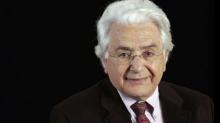Mohammed Arkoun (1928–2010) was a leading scholar of Islam, teaching in France. For more than thirty years he applied academic disciplines of the West to the history and literature of the Muslim world and its ancient traditions. He was known as an advocate of a new Islamic modernism and humanism.
Arkoun was born in Great Kabylia, Algeria, a nation with past colonial ties to France. His native language was Berber. Reared in French schools, he became fluent in French and then learned Arabic as a third language. He studied at the Faculty of Literature of the University of Algiers and at the Sorbonne in Paris. He joined the faculty of philology of Strasbourg University in France (1956–59), teaching also at Lycée Voltaire, Paris, and Lyon II University (1969–72). In 1972 became professor of the history of Islamic thought at the Sorbonne Nouvelle University.
Retired in 1992, Arkoun was a senior research fellow and member of the Board of Governors of The Institute of Ismaili Studies in London. He was a visiting professor at many schools: The University of California, Los Angles; Louvain-La-Neuve University, Belgium; Pontifical Institute of Arabic Studies in Rome; Princeton University; Temple University, Philadelphia; and the University of Amsterdam. He was a fellow at Wissenschaftkolleg in Berlin and Fellow at the Institute of Advanced Studies in Princeton.
His scholarly work gained attention in 1969 when he published work on the medieval Persian historian, Miskawayh (d. 1030), who adapted Greek philosophy, the sciences of chemistry and biology, and historical research to traditional Islam. This prompted Arkoun to consider ways to adapt modern scientific and scholarly thought to Islam in the twentieth-century. He promoted this critical approach as editor of the journal Arabica, serving also as its science editor. He influenced the way English-language scholars viewed Islam, urging them to depart from the dichotomy of Orientalism versus Occidentialism to adopt an epistemological approach to the study of cultures.
He joined several academic and public policy initiatives in Europe to rethink relations between Europe, Islam, and the Mediterranean. France decorated him as an Officer of the French Legion of Honour in July 1996. He also received UCLA’s Seventeenth Georgio Levi Della Vida Award for contributions to Islamic Studies. Other centers of Islamic research, such as the University of Exter’s Institute of Arab and Islamic Studies in England, awarded Arkoun honorary doctorates. During the Exeter award in 2001, he gave a keynote to the international conference “Orientalism Reconsidered.”
Arkoun’s many books have been published in French, English, and Arabic. Those appearing in English include: Islam, Europe and the West (1996); Rethinking Islam: Common Questions, Uncommon Answers (1994); Character: The Essential and the Changeable (1989); Rethinking Islam Today (1987). Arkoun has also influenced the discussion on modern approaches to Islamic architecture and urban renewal. This has been expressed in several published works: The Aga Khan Award as a Process of Thinking (1998); Spirituality in Architecture (1995); Architectural Alternatives in Deteriorating Societies (1992); The Meaning of Cultural Conservation in Muslim Societies (1990); A Policy for Architectural Conservation (1990); Current Islam Faces its Tradition (1989); Islam, Urbanism, and Human Existence Today (1983); and Building and Meaning in the Islamic World (1983).



